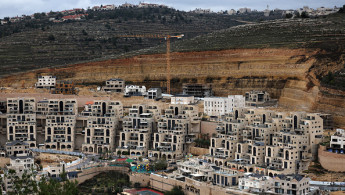Israel to 'push forward' with plan for 7,000 settler units despite 'government freeze'
Israel says it will push forward plans to build over 7,000 settler housing units, despite the government announcing a freeze this week, following an international outcry over earlier settlement expansions.
Israel's Civil Administration's Higher Planning Council approved on Wednesday a plan to build 3,612 housing units, 950 of which are expected to be approved, said the Israeli daily Haaretz.
Plans for a further 3,411 units were given the green light on Thursday, meaning the total exceeds all those approved in 2022 and 2021.
The announcement seemingly contradicts Israel's previous statement on Monday, saying that it would temporarily halt settlement building beyond the nine outposts it approved earlier this month. Those approvals led to an outcry from the EU and US.
Despite this, far-right Finance Minister Bezalel Smotrich - a prominent settler activist - pledged to continue with illegal settlement building in the occupied West Bank.
Many illegal settlements in the occupied territories are set to increase dramatically in size, according to Haaretz.
Settlements such as Ma'ale Adumin, seven kilometres east of Jerusalem, will be expanded by 1,100 housing units, Kochav Yaakov, near Ramallah is expected to increase in size by 630 units, while Giv'at Ze'ev will have 485 housing units added.
According to the Applied Research Institute in Jerusalem, Giv'at Ze'ev was constructed on confiscated land from three nearby Palestinian villages.
Meanwhile, a number of outposts - which are typically built near existing, illegal settlements - are expected to be legalised soon. The outposts will include Mevo’ot Yericho, situated north of the West Bank city of Jericho, as well as Pnei Kedem, also in the occupied territories.
Both settlements and outposts are considered a violation of international law.
Israeli plans to expand settlements have been met with criticism from the UN Security Council, including top ally the United States, who approved of a watered-down statement denouncing them on Monday.
Israeli Prime Minister Benjamin Netanyahu lashed out at the statement, claiming that the UN’s "one-sided statement" denied the rights of Jews to live "in their historic homeland".
UN Secretary-General Antonio Guterres said on Tuesday that Israeli settlements in the occupied Palestinian territories "must stop", labelling them "another roadblock on the path to peace".
Some 700,000 Israeli settlers live illegally in the West Bank and Israeli-annexed East Jerusalem.
Settlements, outposts, and their expansions further exacerbate Palestinian suffering in the occupied territories.





 Follow the Middle East's top stories in English at The New Arab on Google News
Follow the Middle East's top stories in English at The New Arab on Google News


